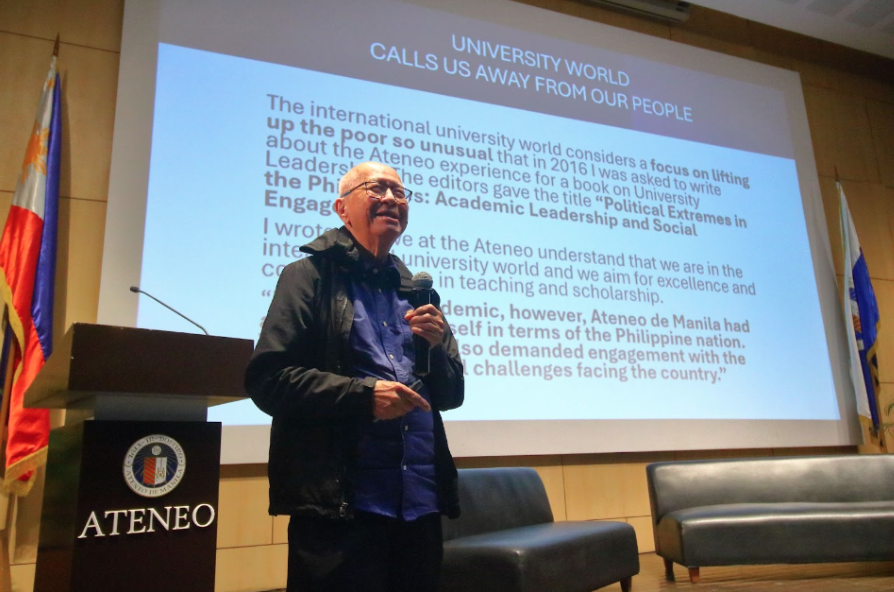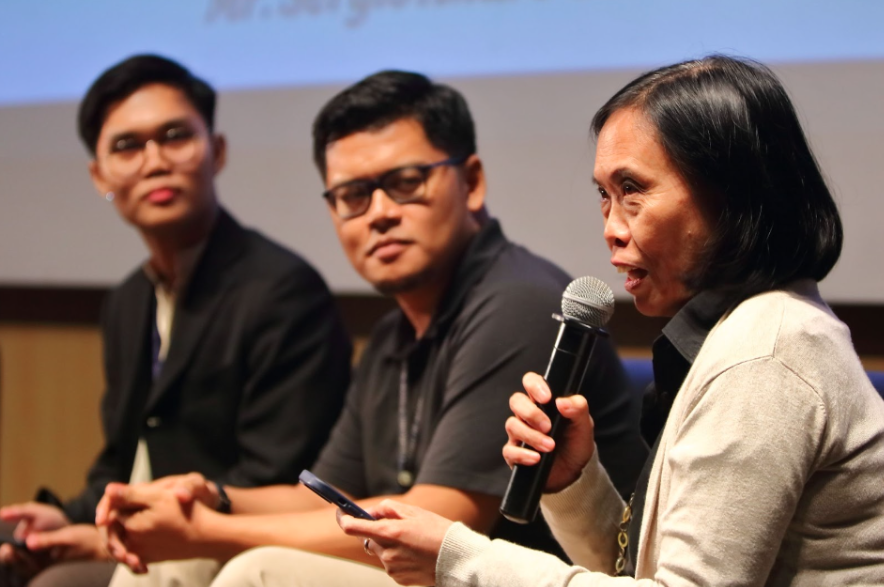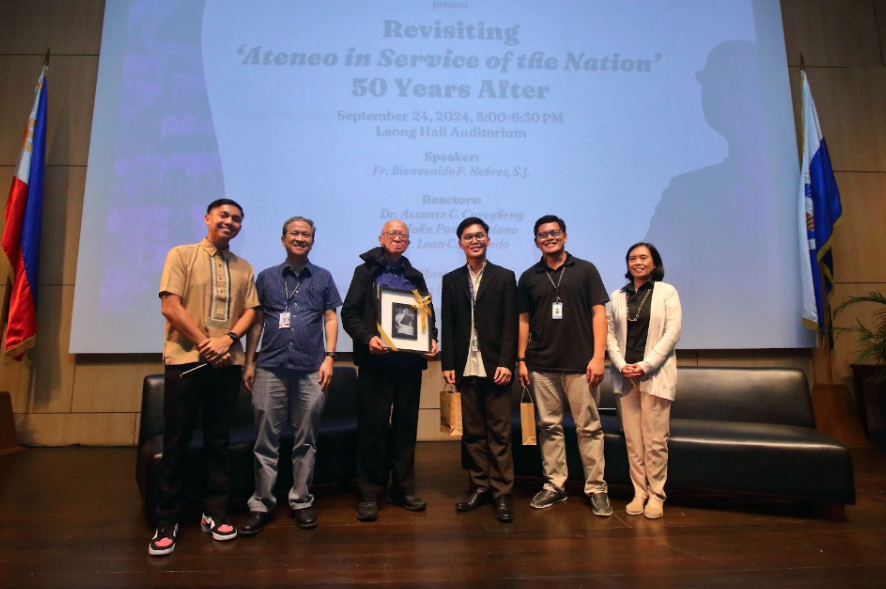Fr Nebres revisits “Ateneo in Service of the Nation” 50 years later with university community
01 May 2025 | Serge Gabriel, Lyka Pacleb

In commemoration of the 52nd anniversary of the Martial Law declaration, the Office of the Vice President for Mission Integration (VPMI) and the Office for Social Concern and Involvement (OSCI) invited former University President Fr Bienvenido Nebres, SJ to look back on his 1974 Faculty Convention speech through the event titled, “Revisiting ‘Ateneo in Service of the Nation’ 50 Years After.” This was held last 24 September 2024 at the Leong Hall Auditorium.
Fr Nebres was joined by Dr Assunta Cuyegkeng (Professor, Department of Educational Leadership and Management of the Gokongwei Brothers School of Education and Learning Design), Dr John Paul Bolano, (Assistant Professor, Department of Theology) and Mr Lean Rosendo (President, Sanggunian ng mga Mag-aaral ng mga Paaralang Loyola) who served as reactors for his talk.

In opening the event, Dr Benjamin Tolosa, Jr. explained the inspiration behind the theme of this year’s commemoration, which was “Tugon ng Sambayanan: Paglilingkod sa Kapwa,” inspired by the very same speech of Fr Nebres. Dr Tolosa said that the restructuring of the university in the 1970s was brought about by the realization of new goals for the university, wherein it is called to move towards community service and genuine involvement in social realities. “It is important to appreciate how Ateneo de Manila University as an institution responded to the signs of the times,” Dr Tolosa said.
Being with others
Fr Nebres began his discussion introducing the surrounding context of Ateneo during the Martial Law period, which he described as a “challenging situation for everybody.” He recalled how some educational institutions had to be closed down, due to their alleged irrelevance to the Philippine context at that time. Referencing the 1968 student manifesto “Down from the Hill,” Fr Nebres said the particular questions being posed on the Ateneo during the period was whether it should still be run, and how the Ateneo can position itself in facing the socio-political realities surrounding it. As Fr Nebres shared, “For whom and for what should the Ateneo be?”
In 1974, with the same questions looming over the university amidst the rising social turmoil, Fr Nebres spoke to the community as then Dean of the Ateneo College of Arts and Sciences. In his Faculty Convention address, titled “Ateneo in the Service of the Nation,” Fr Nebres responded to the “Down from the Hill” manifesto by contextualizing the Ateneo as a “Filipino, Catholic, and Jesuit University.” He then echoed a main point of his speech: “Within the areas then of research, teaching and community service – we find that our task is to dedicate ourselves to… our people…”
But it was not only members of the administration, such as the likes of Fr Nebres, who attempted to emphasize the relevance of Ateneo. Taking up the challenge, Ateneo students organized Sarilikha in 1972, through which Fr Nebres said the students “showed the way” for the rest of the community to follow. The massive flooding in Central Luzon during that same year drove Ateneans to action, as they hoped to “be with the masses” and later on spent their weekends helping the affected farmer communities. “They led what we called then a ‘counterculture’, and the formation of the ‘socially-oriented activities’,” Fr Nebres shared.
Continuing to answer the call 50 years later
After Fr Nebres had given his talk, Dr Cuyegkeng, Dr Bolano, and Mr Rosendo shared their experiences of the University in the context of today’s times. Dr Cuyegkeng discussed her undergraduate experiences in Ateneo, and how her social involvement through student organizations has shaped the way she leads in her current role in the university. Dr Bolano, who also currently serves as the cluster coordinator for the course Theology of the Catholic Social Vision (Theo 12), talked about the experiences of his students going on immersion which remains a part of the Ateneo curriculum. Mr Rosendo, who is also an OSCI Volunteer and a member of their local Sangguniang Kabataan, then talked about his experiences of student volunteerism and how his batchmates are now the ones tasked to make sense of what being in service to the Philippines means in 2024.

Fr Nebres ended with a hopeful note by naming Ateneans who are currently involved in the nation, some of which are coordinating as well with the Ateneo Center for Educational Development (ACED) and Gawad Kalinga (GK) Ateneo. These are namely: Dr Sarah Hesham and the Ateneo School of Medicine and Public Health, who are building toilets in the Dinagat Islands and working to make the Universal Healthcare Act work; Chelsea Paterno and Clarice Enriquez, who are spreading the reach of the Zero Hunger Alliance; Amy Perez-Dycoco, who is bringing Tara Basa all over the country; and Amber Garma with SEED Philippines and Bayan Anihan, who are building community farms and connecting farmers and fisherfolk with institutions.









